

Corruption. The word corrupt when used as an adjective literally means "utterly broken".[1] The word was first used by Aristotle and later by Cicero who added the terms bribe and abandonment of good habits.[2] According to Morris,[3] corruption is described as the illegitimate use of public power to benefit a private interest.
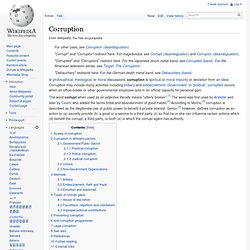
Senior,[4] however, defines corruption as an action to (a) secretly provide (b) a good or a service to a third party (c) so that he or she can influence certain actions which (d) benefit the corrupt, a third party, or both (e) in which the corrupt agent has authority. Scales of corruption[edit] Corruption can occur on different scales. Petty corruption occurs at a smaller scale and within established social frameworks and governing norms. Examples include the exchange of small improper gifts or use of personal connections to obtain favors. Corruption -fr. Un article de Wikipédia, l'encyclopédie libre.
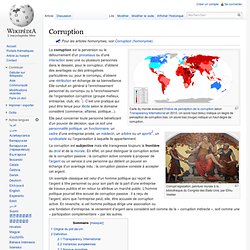
Corrupt legislation, peinture murale à la bibliothèque du Congrès des États-Unis, par Elihu Vedder La corruption est subjective mais elle transgresse toujours la frontière du droit et de la morale. Discrimination. Discrimination is the prejudicial treatment of an individual based on their actual or perceived membership in a certain group or category, "in a way that is worse than the way people are usually treated.
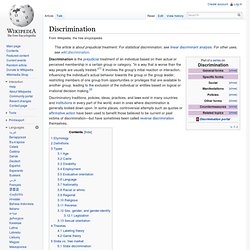
"[1] It involves the group's initial reaction or interaction, influencing the individual's actual behavior towards the group or the group leader, restricting members of one group from opportunities or privileges that are available to another group, leading to the exclusion of the individual or entities based on logical or irrational decision making.[2] Discriminatory traditions, policies, ideas, practices, and laws exist in many countries and institutions in every part of the world, even in ones where discrimination is generally looked down upon. In some places, controversial attempts such as quotas or affirmative action have been used to benefit those believed to be current or past victims of discrimination—but have sometimes been called reverse discrimination themselves.
Lie. A lie is a false statement to a person or group made by another person or group who knows it is not the whole truth, intentionally.[1] A barefaced (or bald-faced) lie is one that is obviously a lie to those hearing it.
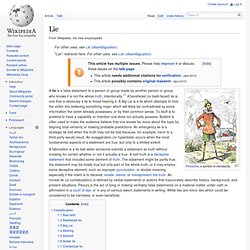
A Big Lie is a lie which attempts to trick the victim into believing something major which will likely be contradicted by some information the victim already possesses, or by their common sense. To bluff is to pretend to have a capability or intention one does not actually possess. Bullshit is often used to make the audience believe that one knows far more about the topic by feigning total certainty or making probable predictions. An emergency lie is a strategic lie told when the truth may not be told because, for example, harm to a third party would result. An exaggeration (or hyperbole) occurs when the most fundamental aspects of a statement are true, but only to a limited extent. Classification[edit] Bad faith[edit] As defined by Sartre, "bad faith" is lying to oneself. Mensonge. Un article de Wikipédia, l'encyclopédie libre.
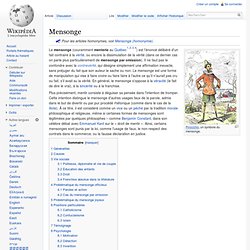
Le mensonge (couramment menterie au Québec[1],[2],[3],[4]) est l'énoncé délibéré d'un fait contraire à la vérité, ou encore la dissimulation de la vérité (dans ce dernier cas on parle plus particulièrement de mensonge par omission). Il ne faut pas le confondre avec la contrevérité, qui désigne simplement une affirmation inexacte, sans préjuger du fait que son auteur le sache ou non. Le mensonge est une forme de manipulation qui vise à faire croire ou faire faire à l'autre ce qu'il n'aurait pas cru ou fait, s'il avait su la vérité.
En général, le mensonge s'oppose à la véracité (le fait de dire le vrai), à la sincérité ou à la franchise. Plus précisément, mentir consiste à déguiser sa pensée dans l'intention de tromper. Généralités[modifier | modifier le code] L'opposition « vérité » et « mensonge » est courante. Morale et religion distinguent traditionnellement trois sortes de mensonges :